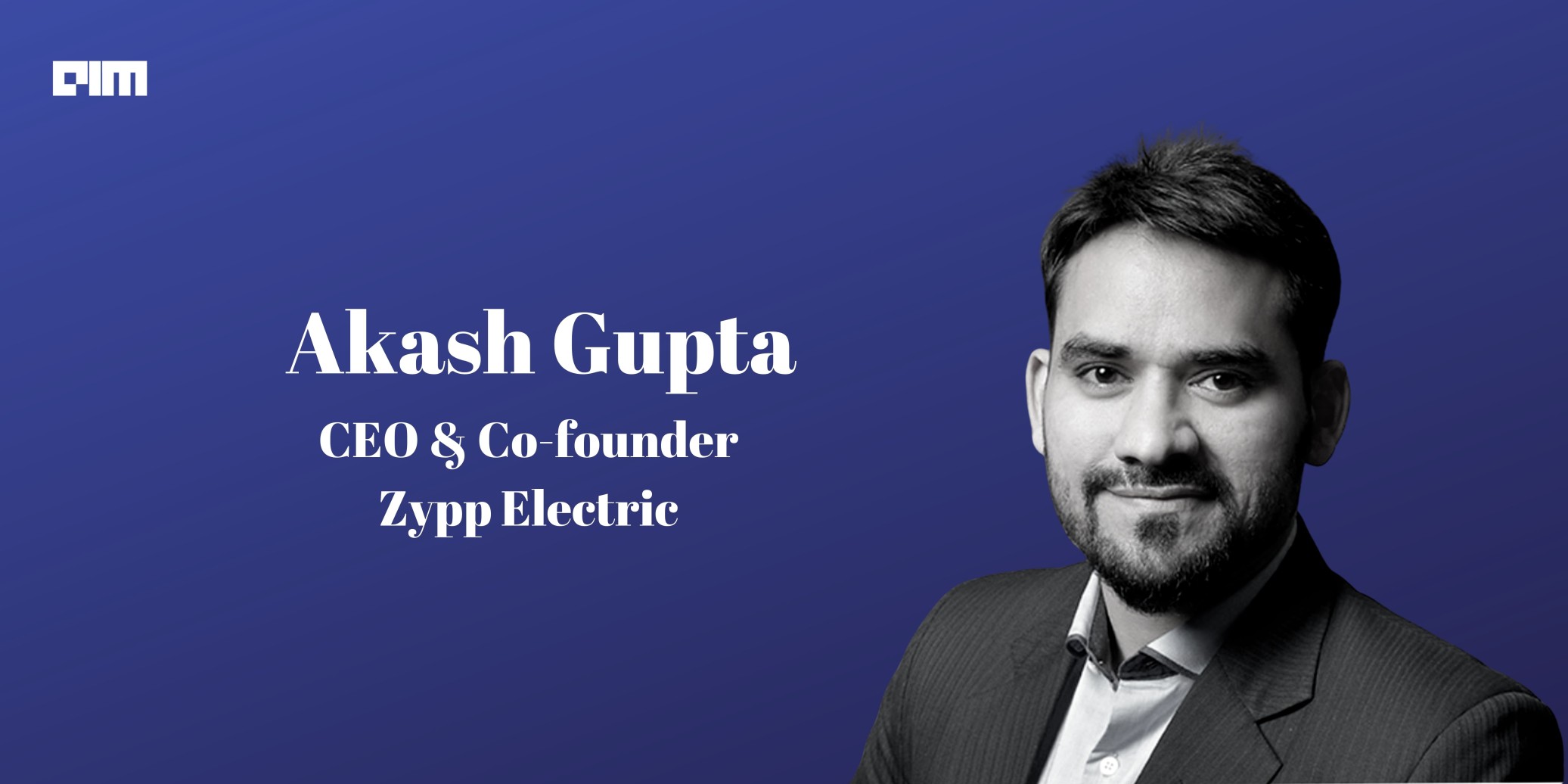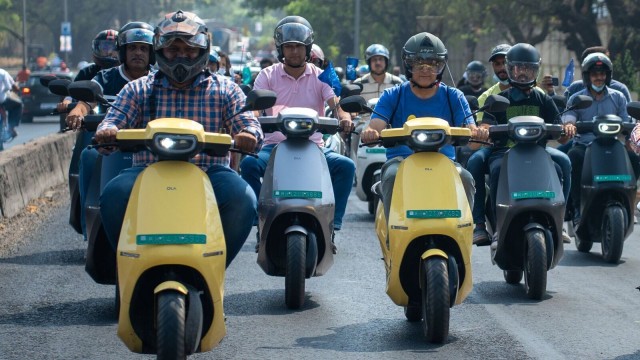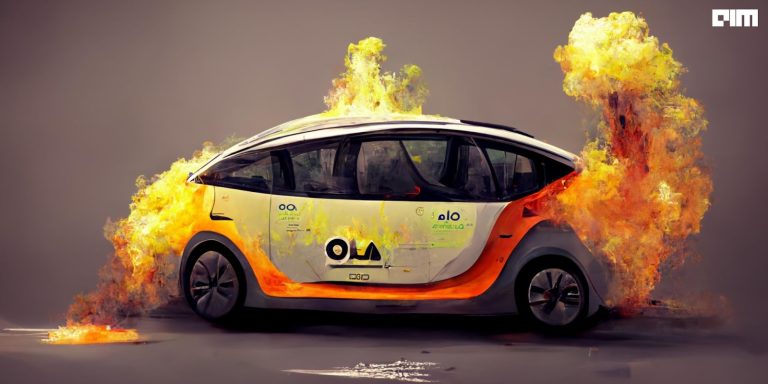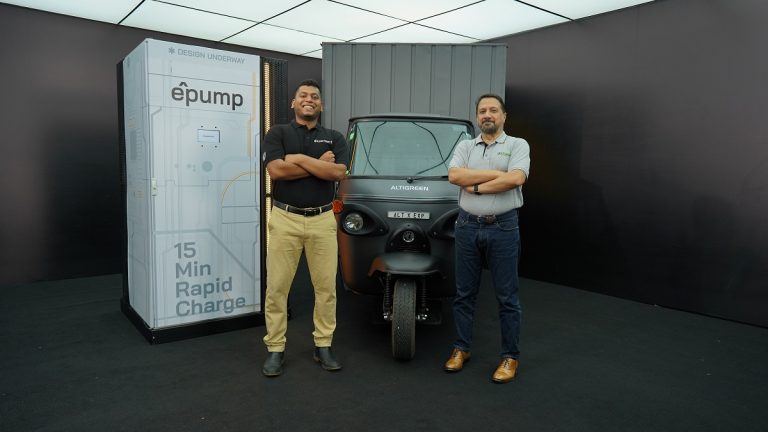|
Listen to this story
|
According to an independent study by CEEW Centre for Energy Finance (CEEW-CEF), the EV market in India will be a USD 206 billion opportunity by 2030 if India maintains steady progress to meet its ambitious 2030 target. This would require a cumulative investment of over USD 180 billion in vehicle production and charging infrastructure, said Akash Gupta, the CEO and co-founder of Zypp Electric.
Zypp Electric is a last-mile EV-based logistics company based in Gurugram. Analytics India Magazine caught up with Akash to understand India’s EV landscape, logistics market and the tech stack powering the Zypp engine.
AIM: How did it all start?
Akash Gupta: Zypp Electric was founded in 2017 to contribute to the Mission Zero-Emission and to make India carbon-free by deploying an ecosystem of Electric Vehicles and EV-based technology that will make last-mile logistics and mobility sustainable. One of the primary ideas behind launching Zypp was to combat the rising pollution since we noticed that there are so many Indian cities that are leading the ranks for being the most polluted cities in the world, which further encouraged us to contribute to this segment.
Zypp Electric worked on IoT and AI technology-enabled smart electric scooters that help solve this problem in a way that not just helps e-commerce giants reduce their logistics costs but also their carbon footprint. We did a market analysis in the United States of America, European nations and South East Asia on the technological advancements and the kind of companies that are working towards solving the emission issues in the mobility sector.
In less than five years, Zypp has become the go-to partner for delivering groceries, medicines, food, and e-commerce packages from point A to point B for companies like Zomato, Swiggy, Amazon, Flipkart, Myntra, BigBasket, PharmEasy, Delhivery, amongst others. These scooters are fully automated IoT and AI-enabled, making them low on maintenance and high on performance. The technology tracks batteries that can be replaced at Zypp swapping stations which are installed at key touchpoints. Eco-friendly EV services also reduce the cost per delivery and help to make the city pollution-free. Currently, it has over 5,000 and increasing Zypp EVs and Pilots (delivery executives) working towards this mission.
AIM: In the past, you have spoken about EV-as-a-service. What does it mean?
Akash Gupta: We have built technology baked in smart electric vehicles, an entire charging infrastructure of swapping stations with a dedicated wing of maintenance and care to keep the fleet running and ensure shipments going smoothly for our customers. Along with this technology, we also provide trained riders that deliver for them and hence this entire package is what we call EV-as-a-Service, where our partners need not worry about their shipments getting delivered to their end consumers.
AIM: What is your USP?
Akash Gupta: We play on a three-pronged approach that involves fleet management, elevated driver experience and seamless customer experience, and we don’t compromise on this in any circumstances.
We have built a robust ecosystem which is not only the largest in India but is also exceptionally managed, be it on the IoT, AI-enabled tech or branded trained manpower. The partners collaborating with us are happy, and the gig workers working for us are happy with the average monthly payout that comes to INR 30,000 – 35,000.
I believe that we have the right data for our what, why, when and where that empowers us to take the right step in launching a new market with an adequate demand and enable new cities one by one toward our Mission Zero Emission.
AIM: Tell us about your tech stack.
Akash Gupta: Living in the kind of era that we are in, we realised that we need a strong integration of technology in our operations. These tech integrations can be seen from when we are onboarding a rider to the day-to-day functioning.
Our UIDAI systems enable us to perform real-time driver verification during onboarding which gets the drivers on the road quickly and increases fleet utilisation. Our driver/rider app is integrated with the back-end services, through which the driver can start/stop the vehicle. Hence all the vehicles are keyless. This was possible by using an IoT-based technology stack.
Being IoT enabled, and GPS tracked, we are able to perform seamless fleet management operations and track the riding state, battery state and location of the vehicles in real-time. This helps us control and safeguard the vehicles. The data analysis and intelligence layer help us make quick fleet decisions for maintenance and operations.
In addition to the front-end, our back-end systems are all on AWS. We also use different AWS services like EC2, RDS and MongoDB.
AIM: In the backdrop of the recent mishaps involving two-wheeler electric vehicles, how do you ensure the safety of your scooters?
Akash Gupta: Well, we know where this question is pointing towards, and yes, we have seen a few instances where mishaps have happened, and that does raise alarms. What we think is the packaging of the battery pack is vital. If the battery is not packed correctly or with substandard materials, it will lead to a short circuit, as in any electronic appliance, leading to a fire. We make sure to have the right BMS in place and the battery pack packed the right way, which reduces the cases close to nil. Size notwithstanding, we use LFP batteries which are much safer compared to traditional NMC technology.
AIM: What are the roadblocks to a wider EV adoption in India?
Akash Gupta: The global EV market is rapidly gaining momentum towards the target set by the Electric Vehicle Initiative (EVI) of global deployment of 20 million electric vehicles by 2020; electric vehicles in India are still at a nascent stage.
The Indian EV ecosystem has immense potential – prominent manufacturers such as Maruti Suzuki India, Hero Electric Vehicles, Mahindra and Mahindra are already registered electric manufacturers in India. Further, Suzuki and Toyota are planning to launch electric vehicles in India.
But, our infrastructure to support EV manufacturing still needs massive improvements. With limited Lithium available globally, India should work on chemistries like Hydrogen, Sodium and more to have longer battery life and more available materials. In addition to manufacturing, I believe there are massive opportunities in building a more evolved and equipped charging infrastructure. We need to collectively work towards building a robust ecosystem that has state-of-the-art charging capabilities and efficient product manufacturing to address the growing EV demand in the country.
AIM: How did the global supply chain disruption impact Zypp Electric?
Akash Gupta: The global chip shortage is a concern, and we preempt that this shortage will continue till 2023 and will gradually get back on track after that. To combat this, we partner with many Indian OEMs to cater to the growing supply. A recent partnership that we closed with Hero Electric for 1.5lc EVs till 2023 is a strategic step towards strengthening our fleet count.
While the recent procurement saw some dip, we believe things will work out the right way soon. Also, with chip shortage and dependence on other markets for the supply of parts, India should try and indigenise 100 percent of EV stack via Make In India programs & PLI support from the government to emerge as winners in the EV market.
AIM: What is next for you?
Akash Gupta: Zypp Electric will continue to sustain this momentum and strive toward capturing the market with dominance while creating an impact. We are currently in Delhi NCR and are planning to expand to 10-30 more cities in India, adding 1.5 lakh EVs by 2023.
With Bengaluru being our next target city, we wish to replicate the business success seen in Delhi NCR with a similar operations strategy adding more of a local-demographic related layer to make it more relatable and easy to adapt for the people in the tech city.
We will continue to invest in team, product, and technology and incorporate more data science-related functionalities to improve the driver and customer experience via tech-enabled last-mile delivery service.
We are also planning to improve and utilise our assets from 9 hours today to 18 hours by the next 12 months, which will be possible on the back of huge infrastructure capabilities and high-end technology.



















































































